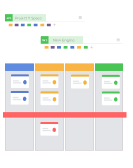Kanban has quickly gained popularity as a go-to method for visualizing workflows. However, when teams seek out a digital Kanban solution, they often mistake Trello as a complete Kanban tool. It's only when they discover that Kanban involves much more than simply moving cards across columns that they begin searching for a more robust alternative.
Enter Businessmap (formerly Kanbanize), a powerful next-step alternative to Trello that’s hard to ignore. But before we dive into the reasons why, let's start with a quick comparison of the two platforms based on the six core practices of Kanban:
| |
Businessmap |
Trello |
| Visualize workflow |
✔ |
✔ |
| Limit work in progress |
✔ |
|
| Manage flow |
✔ |
|
| Make policies explicit |
✔ |
|
| Establish feedback loops |
✔ |
✔ |
| Seek continuous improvement |
✔ |
|
From this table, you can understand that if you only seek the ability to visualize work items, both tools can serve you right. However, if you are looking for professional Kanban software, you need something better than Trello.
At this point, it is logical to ask yourself the difference between a professional Kanban software and one that covers a few practices. To answer this, we will use the Kanban maturity model as a reference. It breaks down the six core practices of Kanban into 7 organizational maturity levels and 132 sub-practices depending on how adept you are with it.
Visualization
| |
Businessmap |
Trello |
| Visualize an individual’s work by means of a personal Kanban board |
✔ |
✔ |
| Visualize basic work item related information on a ticket |
✔ |
✔ |
| Visualize work for several individuals by means of an aggregated personal Kanban board |
✔ |
|
| Visualize the work carried out by a team by means of a team Kanban board |
✔ |
✔ |
| Use avatars to visualize an individual’s workload |
✔ |
✔ |
| Visualize initial policies |
✔ |
|
| Visualize teamwork by means of an emergent workflow Kanban board |
✔ |
|
| Visualize work items on Kanban board with per-person WIP limits |
✔ |
|
| Visualize work types by means of card colors or board rows |
✔ |
|
| Visualize blocked work items |
✔ |
|
| Visualize development of options by means of a discovery Kanban board |
✔ |
✔ |
| Visualize individual workload on a discovery Kanban board by means of per-person WIP limits, potentially implemented using avatars |
✔ |
|
| Visualize basic policies |
✔ |
|
| Ticket design: Visualize concurrent or unordered activities with checkboxes |
✔ |
✔ |
| Ticket design: Visualize concurrent activities performed by specialist teams using partial rows |
✔ |
|
| Board design: Visualize sequential activities where no dependency or preferred sequence exists using rows or vertical spaces |
✔ |
|
| Visualize defects and other rework types |
✔ |
✔ |
| Visualize CONWIP |
✔ |
|
| Visualize workflow by means of enhanced discovery/delivery boards |
✔ |
✔ |
| Visualize project progress on a portfolio Kanban board |
✔ |
|
| Visualize “ready to commit” status, also known as “ready to pull” |
✔ |
✔ |
| Visualize “ready to pull” criteria, also known as “definition of ready”, “entry criteria” |
✔ |
✔ |
| Visualize workflow and teamwork items on one Kanban board |
✔ |
|
| Visualize project work items on a two-tiered project Kanban board |
✔ |
|
| Visualize parent-child and peer-peer dependencies |
✔ |
|
| Use parking lot to visualize dependent work requests of another service or system currently waiting or blocked |
✔ |
|
| Visualize upstream options by means of an upstream/discovery Kanban board |
✔ |
✔ |
| Visualize discarded options using a bin on an upstream/ discovery Kanban board |
✔ |
✔ |
| Visualize replenishment signals |
✔ |
|
| Visualize pull signals |
✔ |
✔ |
| Visualize pull criteria (also known as “pull policies”, “definition of ready”, “exit criteria”) |
✔ |
|
| Visualize available capacity |
✔ |
|
| Visualize work item aging |
✔ |
|
| Visualize target date or SLA |
✔ |
✔ |
| Visualize failure demand versus value demand |
|
|
| Visualize aborted work |
✔ |
✔ |
| Visualize class of service using ticket colors, board rows or ticket decorators |
✔ |
|
| Use Earned Value portfolio Kanban board to visualize project progress and schedule or budget risk |
✔ |
|
| Visualize local cycle time |
|
|
| Use ticket decorators to indicate risks |
✔ |
|
| Visualize risk classes with different swimlanes |
✔ |
|
Trello is a fantastic tool for getting started with Kanban visualization. However, as your team matures, you will inevitably feel some limitations. For example, you won’t be able to visualize blocked items, create a flexible board layout, or make classes of service transparent.
If you are already at this stage and are looking for a Trello alternative to facilitate more advanced Kanban implementation, Businessmap won’t disappoint you.
Limiting WIP
| |
Businessmap |
Trello |
| Establish personal WIP limits |
✔ |
|
| Establish per person WIP limits |
✔ |
|
| Establish team WIP limits |
✔ |
✔ |
| Establish activity based WIP limits |
✔ |
|
| Establish CONWIP limits on emergent workflow |
✔ |
|
| Use an order point (min limit) for upstream replenishment |
✔ |
|
| Use a max limit to define capacity |
✔ |
|
| Bracket WIP limits for different states |
✔ |
|
Limiting work in progress allows you to focus team capacity on what is already started before engaging with new tasks. This is Kanban’s primary way of optimizing efficiency, so you will definitely need functionalities related to limiting it.
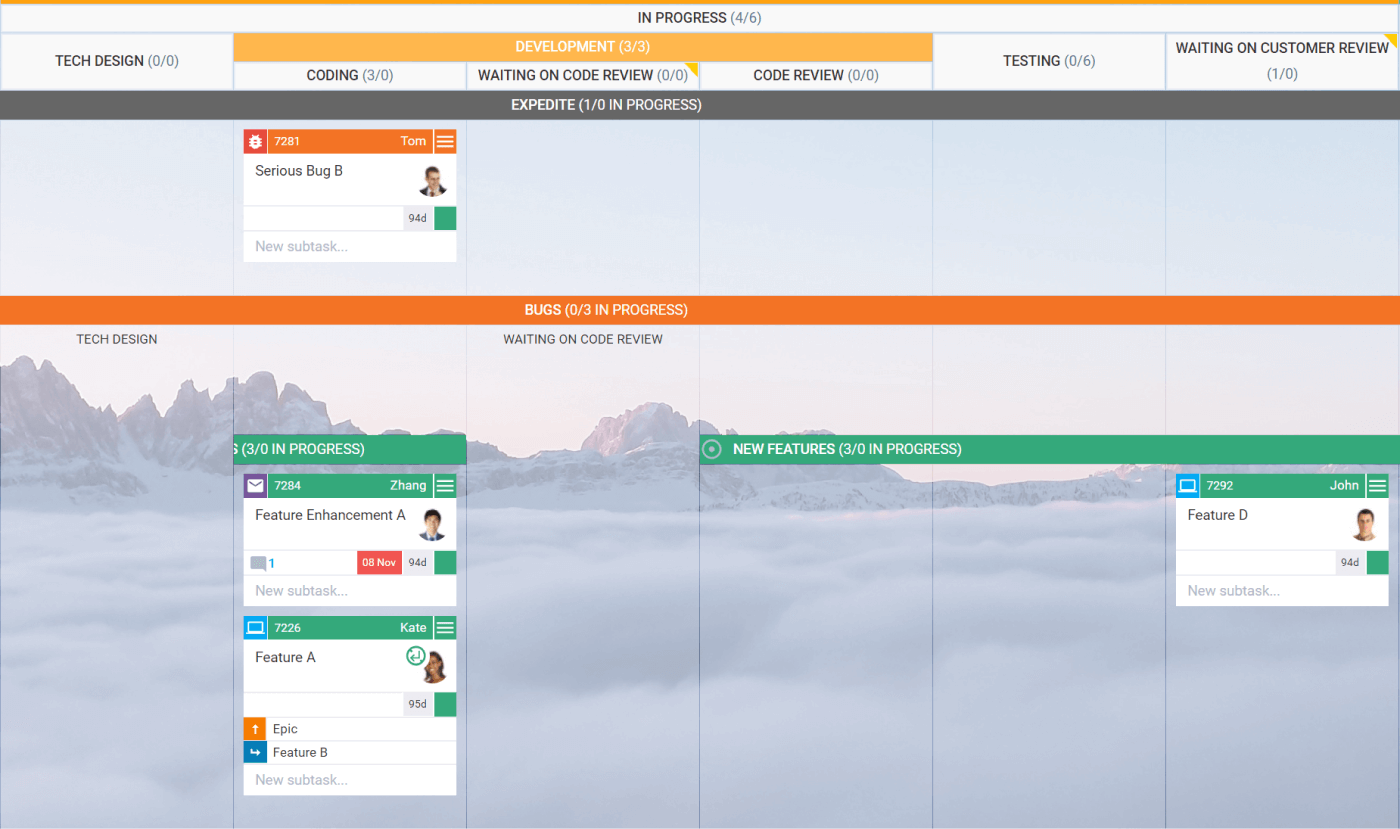
A quick look at all the different ways to do so in the table above gives you an instant answer why Businessmap is better than Trello for practicing Kanban. So, if you are ready to take the next step you should carefully consider your options.
Managing Flow
| |
Businessmap |
Trello |
| Define work types based on the nature of tasks |
✔ |
|
| Define work types based on customer requests |
✔ |
|
| Map upstream and downstream flow |
✔ |
✔ |
| Manage blocking issues |
✔ |
|
| Manage defects and other rework types |
✔ |
|
| Organize around the knowledge discovery process |
|
|
| Use a cumulative flow diagram to monitor queues |
✔ |
|
| Report rudimentary flow efficiency to understand the value of reducing buffers and the leverage of eliminating sources of delay |
✔ |
|
| Manage dependencies |
✔ |
|
| Collect and report detailed flow efficiency analysis |
✔ |
|
| Determine the reference class data set |
✔ |
|
| Forecast using reference classes, Monte Carlo simulations and other models |
✔ |
|
| Allocate capacity across swimlanes |
|
|
| Allocate capacity by the color of a work item |
|
|
| Make appropriate use of forecasting |
✔ |
|
| Assess forecasting models for robustness |
|
|
Managing flow can easily be considered managing process efficiency. To do so, you need a variety of features for measuring the stability of your process, forecasting, and managing work types.
What really makes Businessmap stand out as a next-step alternative to Trello is its ability to break down a project and manage dependencies between tasks.
Making Policies Explicit
| |
Businessmap |
Trello |
| Define personal Kanban policies |
✔ |
|
| Define Initial Policies |
✔ |
|
| Define initial services |
✔ |
✔ |
| Elaborate further policies |
✔ |
|
| Define blocking issue escalation policies |
✔ |
|
| Define policies for managing defects and other rework types |
✔ |
|
| Establish initial request acceptance policies |
✔ |
|
| Define work request abandonment policies |
✔ |
|
| Establish replenishment commitment point |
✔ |
|
| Establish pull criteria |
✔ |
|
| Establish a delivery commitment point |
✔ |
|
| Define classes of service |
✔ |
|
| Collect and report detailed flow efficiency analysis |
✔ |
|
| Establish demand shaping policies |
|
|
Process policies are your workflow’s law. The clearer you make them, the easier it is for your team to follow them and perform at their best. Trello is more suitable for personal use than advanced Kanban implementation.
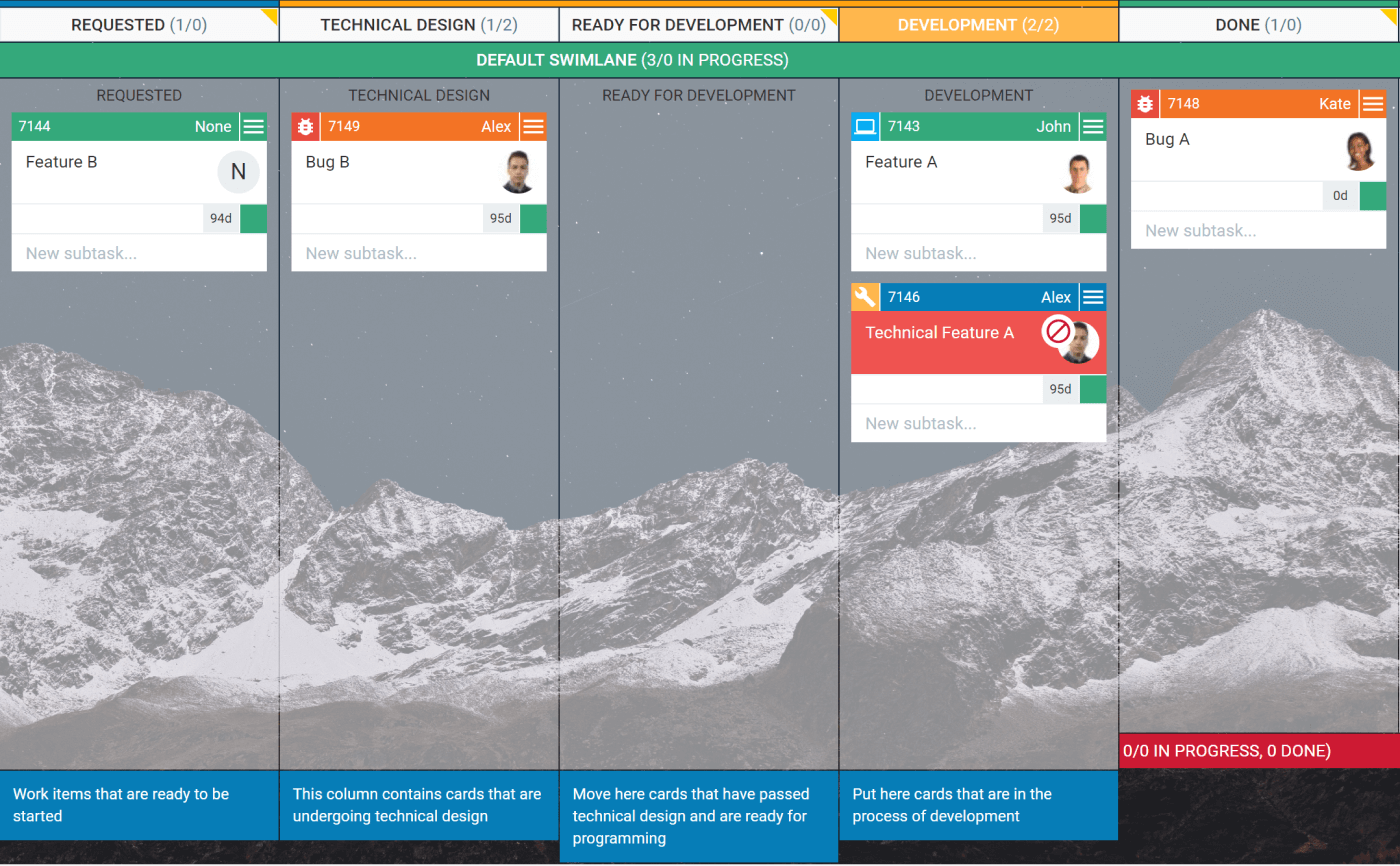
Businessmap is a logical next-step alternative to Trello. It has a plethora of features for advanced process management with Kanban, which allows you to implement all but two of the above-listed practices.
Establish Feedback Loops
| |
Businessmap |
Trello |
| Ability to leave comments |
✔ |
✔ |
| Email Integration |
✔ |
✔ |
| In-app notifications |
✔ |
✔ |
| Push notifications |
✔ |
✔ |
Businessmap and Trello have very similar features regarding feedback loops. You can leave comments to your team regarding any assignment on your projects. Both platforms are equipped with in-app notifications and desktop push notifications.
On the other hand, the email integration feature of Businessmap is bidirectional, so you can also send emails directly from cards.
Continuous Improvement
Kanban software solutions can be instrumental in achieving continuous improvement. They provide analytics to measure process performance and show room for improvement.
Businessmap is a next-step Trello alternative equipped with a robust analytics module that provides detailed insight into the most important Kanban metrics, such as:
- Cycle time
- Throughput
- Aging work in progress
Please visit our dedicated analytics page to learn more about the available charts.
Primary Strengths of Businessmap
If you are considering a switch to Businessmap, we’ve gathered some of the most notable strengths that have led people like you here before.
✔ Greater Transparency
From a visualization perspective, Businessmap provides a far greater diversity of features for mapping your workflow and getting everybody on your team in the loop about what is happening.
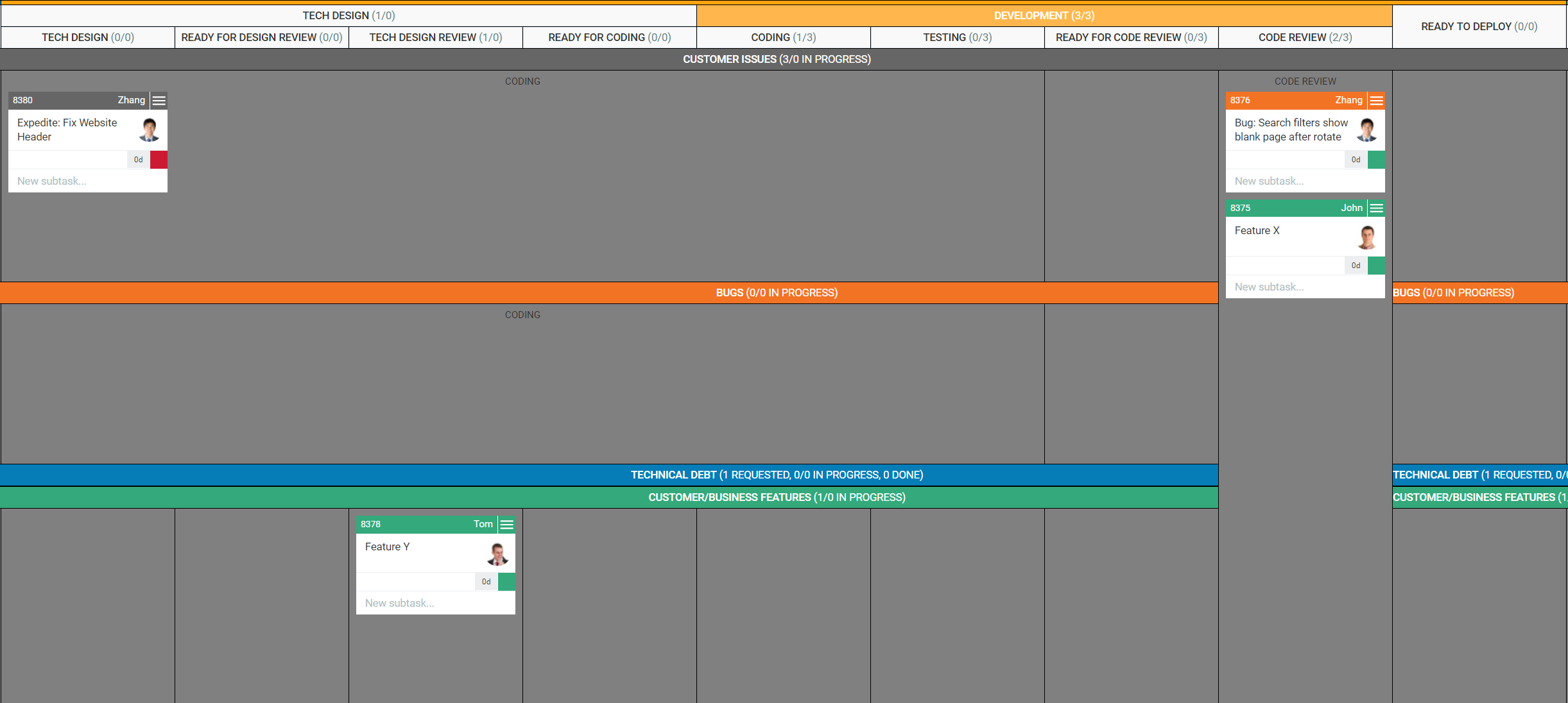
For instance, you can create a comprehensive board layout containing as many columns and swimlanes as you need. Nonetheless, you can merge or split them as you please to create a design that perfectly fits your needs. On top of that, this is done with just a few clicks, thanks to the flexible workflow designer inside.
As a next-step alternative to Trello, Businessmap allows you to define various block types for any problem that may appear in your workflow. Afterward, you can visualize them as card tokens and make issues transparent as soon as they occur.
✔ Limiting the Work-in-Progress
By setting WIP limits, you can keep your team focused and protect your process from becoming cluttered with started but unfinished work.
Whether you prefer limiting work on an individual level, setting up CONWIP for your team, or even limiting work per project dispersed across several teams, Businessmap allows you to do so with just a few clicks.
✔ Improved Collaboration
Businessmap allows you to facilitate better team collaboration by providing a system for visualizing various task dependencies such as:
- Parent-Child
- Predecessor-Successor
- Relative
With their help, you can break down large initiatives and connect the different aspects that comprise them.
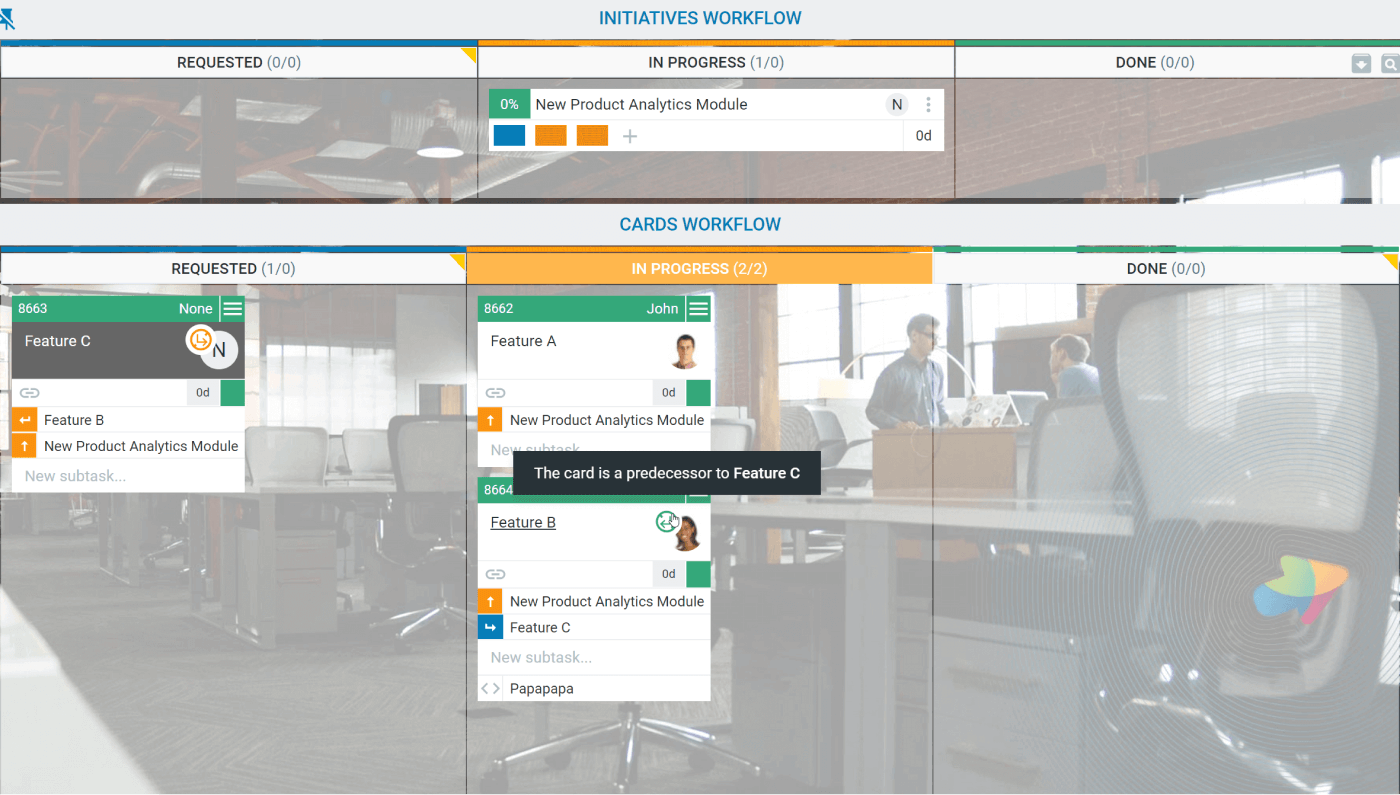
You can specify the processing order and improve the execution handling.
Collecting Workflow Metrics
Analytics are another reason to consider Businessmap. With the available set in our platform, you can gather data about the cumulative flow of tasks in your process to maintain stability.
In Businessmap, you can also gather various data regarding the performance of your assignments. For example, you can measure the cycle time of every card and initiative in your workflow, see trends (increasing or decreasing over time), and filter cycle time by criteria such as type, assignee, priority, and much more.
Process Automation
Why waste time on activities that can be easily automated? Businessmap is equipped with a powerful business rules engine that you can put to use for various types of workflow automation. You set up hooks that trigger actions when certain events occur.
Transitioning to Businessmap
When transitioning from Trello to Businessmap, we encourage you to check the Businessmap product knowledge base. You can find an extensive archive of information regarding features and functionalities in Businessmap.
If you wonder how you can transfer your projects from Trello to Businessmap, don’t worry. We have developed an integration between the platforms that allows you to transfer all your cards to Businessmap easily.
All you need to do is re-create your boards in Businessmap, and everything else will be copied from Trello.
Both platforms use a very similar glossary, so the transition will feel seamless. Here are some of the most fundamental terms in Businessmap as an alternative to Trello:
| Businessmap |
Trello |
| Board |
Board |
| Card |
Card |
| Tag |
Label |
| Deadline |
Due date |
| Subtask |
Checklist |
To get you up to speed quickly, we have developed an onboarding process in Businessmap that will walk you get you started with the platform when you create an account.
In addition, our team is always ready to assist, so send us a message, and we will contact you shortly.
Accelerate project delivery.
Gain visibility across all projects and portfolios.






